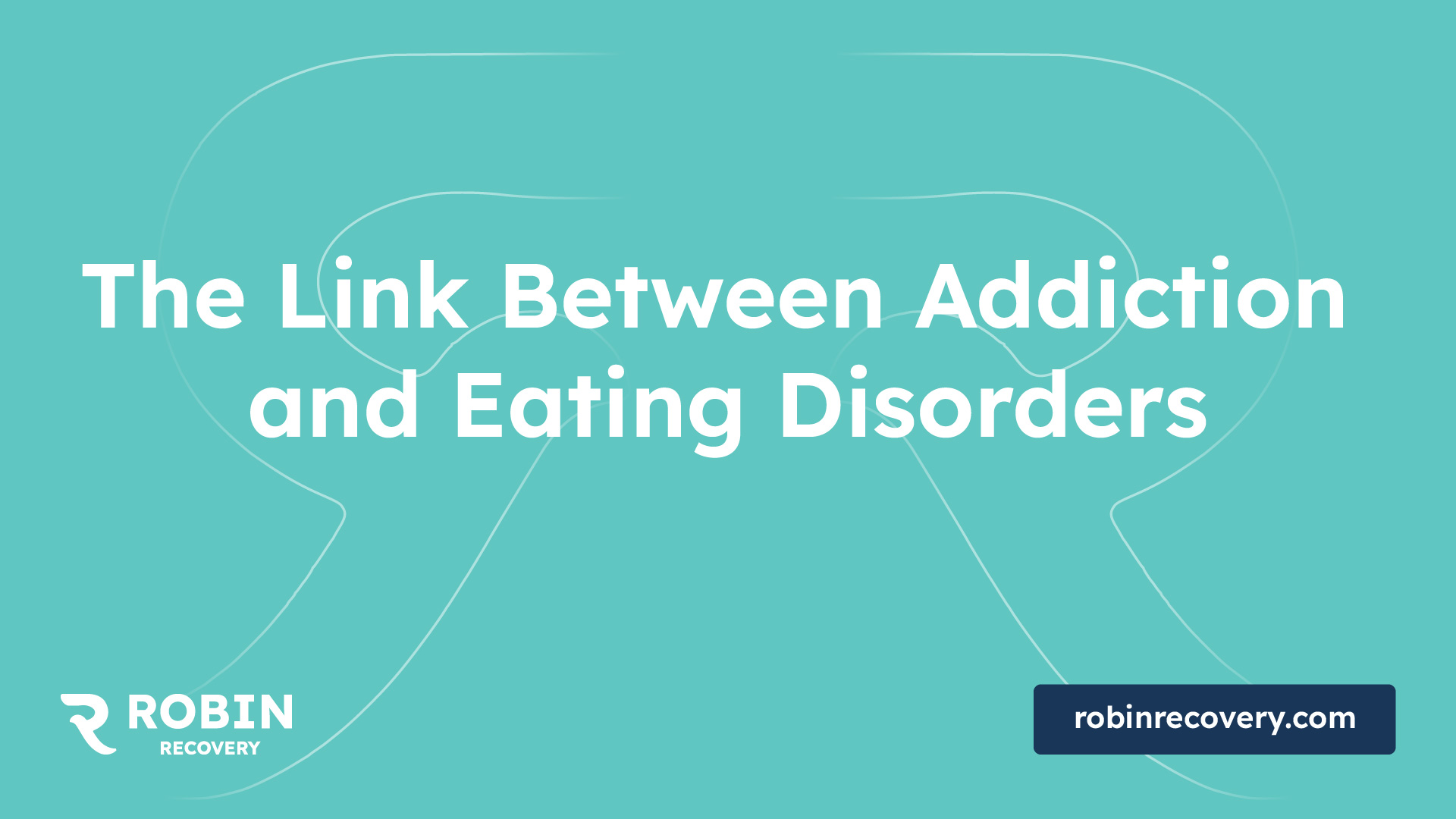The Link Between Addiction and Eating Disorders

Understanding Co-Occurring Disorders
Co-occurring disorders refer to the simultaneous presence of multiple disorders in an individual. One notable combination is the link between addiction and eating disorders. This connection can often be attributed to maladaptive coping mechanisms and shared risk factors.

Maladaptive Coping Mechanisms
Both eating disorders and addiction serve as maladaptive coping mechanisms. They represent unhealthy and unsustainable ways to handle everyday stressors [1]. Individuals may resort to these behaviors as a means of escaping emotional pain or distress.
Shared Risk Factors
Research indicates that eating disorders and substance use disorders share several risk factors, leading to a heightened likelihood of co-occurrence. These risk factors include:
Risk FactorDescriptionTraumaExperiences of trauma can increase vulnerability to both eating disorders and addiction.GeneticsA family history of addiction may predispose individuals to similar behaviors related to eating and substance use. (Eating Behaviors)Environmental ContextThe environment and life circumstances can influence the development of both disorders.PerfectionismHigh standards and perfectionist attitudes can lead to increased pressure, ultimately contributing to these disorders.Low Self-EsteemIndividuals with low self-esteem may seek control through restrictive eating or substance abuse.
Healthcare professionals recognize the overlapping traits that contribute to these conditions [1]. Misconceptions about the relationship often exist, such as the belief that one disorder causes the other; in reality, both require tailored treatment plans to address the complexities involved.
Understanding co-occurring disorders is essential for better support and recovery strategies. To learn more about navigating these challenges, consider reading about the myths and realities surrounding addiction and recovery approaches.
Neurological Insights
Understanding the neurological underpinnings of the relationship between addiction and eating disorders is crucial. Central to this is the impact on serotonin receptors and the brain's reward circuits.
Impact on Serotonin Receptors
The role of serotonin in regulating mood and behavior is well documented. PET imaging studies indicate that individuals with anorexia nervosa (AN) and bulimia nervosa (BN) show higher serotonin 1A-receptor binding when they are ill, as well as after recovery. This suggests state-independent alterations in serotonin functioning within these populations. Conversely, the serotonin 2A-receptor appears to be normal in those with AN while ill, but shows lower binding after recovery, indicating a dynamic adaptation in response to their condition [2].
ConditionSerotonin 1A-Receptor BindingSerotonin 2A-Receptor BindingAnorexia Nervosa (ill)ElevatedNormalAnorexia Nervosa (post-recovery)ElevatedDecreasedBulimia Nervosa (ill)ElevatedUnknown
Studies have further observed altered connectivity within the default mode network in individuals with AN, potentially driven by lower blood glucose levels. This highlights the importance of physiological factors in neurological function within these disorders [2].
Altered Brain Reward Circuits
The brain's reward circuits exhibit significant changes in individuals with eating disorders. Particularly in AN, research has found that altered learning and dopamine function may contribute to a dysregulated experience of pleasure and reward. For instance, those with AN may have a heightened dopamine response to certain stimuli, which does not normalize easily even after weight recovery [2].
Interestingly, individuals with AN rated gentle touch and intimate visual stimuli as less pleasant compared to controls. This reduction in reward experience correlates with decreased activity in key brain regions such as the caudate and parietal areas [2].
In addition, food addiction may also reflect similar patterns of altered reward circuit activation. Neuroimaging studies have revealed distinct activation patterns in regions including the striatum, amygdala, and orbitofrontal cortex among those exhibiting food addiction behaviors. These findings underscore the shared symptomologies between food addiction and other pathological eating disorders like binge eating [3].
A comprehensive understanding of these neurological insights can inform better treatment strategies and support methods for individuals struggling with both addiction and eating disorders. For more insights into treatment approaches, refer to our section on treatment and support.
Treatment and Support
Addressing the link between addiction and eating disorders requires comprehensive treatment and support strategies. Integrated treatment approaches and effective recovery strategies play vital roles in ensuring lasting recovery.
Integrated Treatment Approaches
Recovery from eating disorders and substance abuse can be achieved through appropriate treatment, support, and dedication. Integrated treatment approaches that address both conditions simultaneously tend to be the most effective for achieving lasting recovery. [Cumberland Heights].
These integrated programs often include a multidisciplinary team of healthcare professionals, including medical doctors, therapists, and nutritionists. This collaborative effort allows for personalized treatment plans that cater to the unique needs of individuals facing both disorders.
Key components of integrated treatment may include:
Treatment ComponentDescriptionIndividual TherapyOne-on-one sessions with a therapist focusing on the underlying issues of both disorders.Group TherapySupportive group sessions that foster shared experiences and coping strategies.Nutritional CounselingGuidance on developing a healthy relationship with food and nutritional needs.Medical MonitoringOngoing health assessments to manage and monitor any medical issues related to both disorders.
Recovery Strategies
Those recovering from eating disorders and substance use disorders often require specialized integrated treatment programs. Addressing both conditions together is essential for long-term recovery since treating only one condition may lead to relapse in the untreated disorder or both disorders [ANAD].
Some effective recovery strategies include:
These strategies reinforce the importance of holistic and integrated treatment that supports individuals on their path to recovery. Providing resources and continuous support aids in overcoming the significant challenges posed by co-occurring disorders. For individuals or families looking for further assistance, they may find useful information in related resources such as getting help for an adult child addicted to drugs and alcohol or four of the biggest myths about trauma and addiction.
Risk Factors and Comorbidities
Understanding the interplay of various risk factors and comorbidities is crucial in exploring the link between addiction and eating disorders. Genetic predispositions and impulsivity are two significant components that contribute to the development of both disorders.
Genetic and Environmental Influences
Research indicates that individuals with a first-degree relative history of alcoholism may have an increased likelihood of developing eating and substance use psychopathologies. The causes of eating disorders and addictions share several characteristics, including genetic predispositions, environmental stressors, trauma, and psychological vulnerabilities. These risk factors can impact individuals from diverse backgrounds.
FactorInfluenceGenetic PredispositionFamily history of alcoholism and other substance use disorders can elevate risk.Environmental StressorsFactors such as trauma and abuse can contribute to the onset of both conditions.Psychological VulnerabilitiesConditions like depression and anxiety may predispose individuals to develop an eating disorder or addiction.
Common myths exist around the relationship between eating disorders and addiction. Some believe that substance abuse leads to eating disorders or vice versa, while others assume that simply treating one condition will resolve the other. In reality, both require tailored treatment plans, as these disorders are intertwined through biological and environmental influences [5].
Impulsivity and Psychopathological States
The presence of comorbid mental health conditions substantially heightens the risk of developing eating disorders. Individuals exhibiting addictive behaviors at baseline are more likely to experience higher dropout rates during therapy. Furthermore, the coexistence of eating disorders and addiction-related behaviors often correlates with more severe eating disorder symptoms and adverse psychopathological states.
Impulsivity plays a pivotal role in the onset and progression of eating disorders. Research shows that poor inhibitory control at the outset of treatment can predict inadequate remission of eating disorder symptoms. Key findings include:
TraitImpactHigh Novelty SeekingLinked to a worse prognosis for eating disorders.Poor InhibitionPredicts poorer symptom resolution at follow-up.
Individuals who struggle with higher levels of impulsivity and risk-taking behaviors are often at greater risk for developing both eating disorders and addiction issues, underscoring the necessity of comprehensive evaluation and intervention strategies in order to provide effective support.
Behavioral Addictions
Behavioral addictions refer to the inability to resist impulses towards rewarding stimuli, which often results in negative consequences. This section explores the prevalence of these addictions and the connection between impulsivity and inhibitory control.
Prevalence of Behavioral Addictions
Estimates of the prevalence of behavioral addictions indicate a significant range across different types of addictive behaviors.
Type of Behavioral AddictionPrevalence (%)Gambling0.1% - 6.0%Gaming Disorder3% - 6%Compulsive Buying5%
The surge in behavioral addictions, particularly those associated with technology, has garnered increased scientific interest in recent years [6]. These statistics highlight the widespread presence of behavioral addictions in society and their potential impact on individuals' lives.
Impulsivity and Inhibitory Control
Impulsivity is a critical factor in the development of both behavioral addictions and eating disorders. Research indicates that individuals with poor inhibitory control may face challenges in maintaining remission from eating disorder symptoms post-treatment. High levels of novelty seeking along with poor inhibition can negatively affect long-term recovery outcomes.
Stressful situations can further exacerbate addictive behaviors. Individuals may respond to stress by engaging in binge eating or developing cravings for highly palatable foods. For those with food addiction, these behaviors can serve as a coping mechanism for negative emotions. In such contexts, stress and negative emotions may resemble withdrawal symptoms, complicating the recovery process [3].
Understanding the link between impulsivity and behavioral addictions can provide insights into both preventive strategies and treatment options for those struggling with these challenges. The recognition of these factors is essential for developing effective interventions in the context of the link between addiction and eating disorders.
Awareness and Support
Navigating the complexities of addiction and eating disorders necessitates awareness, education, and support resources. Understanding available options can empower individuals on their journey to recovery.
Resources for Recovery
Many organizations provide support for those struggling with the dual challenges of addiction and eating disorders. One notable resource is the National Eating Disorders Association (NEDA), which offers a wealth of information and assistance. They provide tools for assessment, such as the Eating Disorders Screening Tool, which helps individuals determine if it's time to seek professional help.
Additionally, participation in community events such as NEDA Walks can foster social connections and raise awareness while supporting the recovery process. Other recovery strategies might include access to integrated treatment programs that address both eating disorders and addictions holistically, reflecting the shared causes and risk factors of these conditions.
ResourceDescriptionNEDAOffers screening tools, support groups, and awareness events.Integrated Treatment ProgramsAddress both addiction and eating disorders simultaneously for effective recovery.Support GroupsProvide community and a sense of belonging for individuals facing similar struggles.
Myths and Realities
Understanding the myths surrounding addiction and eating disorders is crucial for creating a supportive environment. Many misconceptions can deter individuals from seeking help or worsen their situations.
MythRealityAddiction and eating disorders are separate issues.Both share overlapping causes such as trauma, genetic predisposition, and psychological vulnerabilities.People can overcome these issues without help.Professional support and integrated treatment approaches significantly enhance recovery chances.Only certain demographics are affected.These disorders can affect individuals from all backgrounds and demographics.
Combatting these myths is essential in promoting awareness and support. Educational resources, such as four of the biggest myths about trauma and addiction, can serve as valuable tools in dispelling misinformation and encouraging productive conversations about recovery.
Through the right resources, support systems, and a clear understanding of the realities surrounding addiction and eating disorders, individuals can take informed steps toward recovery.
References
[2]:
[3]:
[4]:
[5]:
[6]:
[7]:
